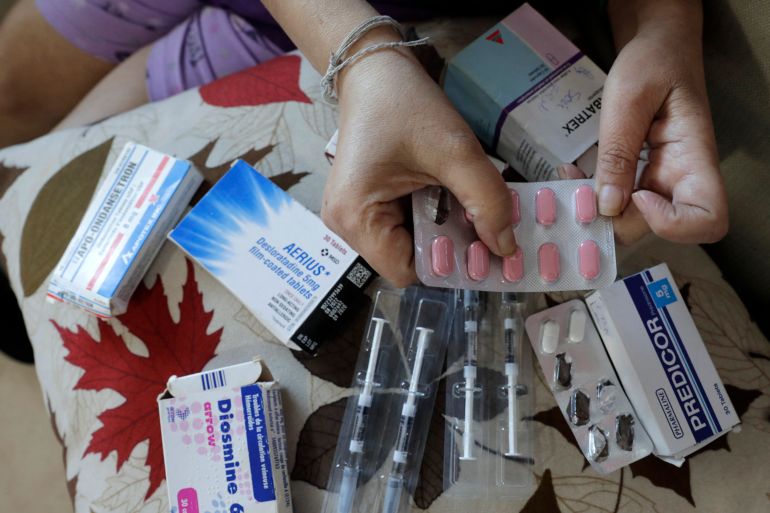Lebanon cancer patients living in fear after drug subsidies lift
Cancer drugs are the last-standing subsidised medications in Lebanon, but the economic crisis offers no guarantees for the future.

Since crisis-hit Lebanon announced the partial lifting of medicine subsidies last month, including on some drugs for chronic illnesses, cancer patients fear their life-saving treatment could be next in line.
In a ward of the Naef K Basile Cancer Institute, at the American University of Beirut’s Medical Center (AUBMC), breast cancer patient Janette Marhij said the economic meltdown crippling Lebanon’s fragile healthcare system had been more distressing than living through the country’s 15-year civil war that ended in 1990.
Keep reading
list of 3 itemsCash-strapped Lebanon wakes up to countrywide roadblocks
Lebanon launches cash card aid, despite funding shortfall
“During the war at least people had money,” said Marhij, 63. “We’ve never experienced anything like this.”
Adding to the fear of not surviving cancer, the mother of four worries she will not be able to secure the medication needed to complete the treatment amid soaring prices and drug shortages.
“My son takes care of my medicines, he asks friends and acquaintances to search pharmacies around them,” Marhij said. “I’m dependent on him, I have no choice. If prices go up, I don’t know how he will be able to afford it.”
For more than two years, Lebanon has been in the throes of a deepening economic crisis that has plunged nearly three-quarters of its population into poverty.
The country’s central bank has for years provided subsidies for medicines, fuel and wheat to keep them at the country’s official pegged rate of $1 to 1,500 Lebanese pounds. But since the value of the local currency began tumbling in mid-2019, the central bank has been pulling back on subsidies draining its foreign reserves.
In November, the health ministry slashed medical subsidies from $120m per month to about $35m, raising the price of a wide range of medications by up to four times.
Cancer medications are among a small group of drugs still subsidised by the state. Other medications for chronic diseases, such as insulin, were hit by the lifting of subsidies and now cost more than the monthly minimum wage (from about 180,000 Lebanese pounds to 730,000).
Riwa al-Atrash, a health ministry spokesperson, told Al Jazeera that “there is no plan to lift the subsidies” for cancer medication. However, she admitted that Lebanon’s economic crisis – described as one of the world’s worst in decades – offers no guarantees for the future.
The price hikes, coupled with the currency devaluation, have already left many Lebanese with deeply devalued salaries in the local currency struggling to afford basic medication.
A 50-tablet box of Buscopan cost 12,418 Lebanese pounds ($8) in October 2019 and now costs a little over 141,000 Lebanese pounds – the equivalent of $94 dollars at the official currency exchange rate.
Amnesty International on Thursday criticised the Lebanese authorities for “failing to safeguard the rights to health and life for the country’s population”.
“Lifting subsidies on medication without ensuring that there is a social protection framework in place to guarantee their access to essential medication is an act of deep recklessness,” said Lynn Maalouf, Amnesty’s deputy regional director for the Middle East and North Africa.
Affordability, however, is only one hurdle. In the lobby of the AUBMC’s cancer centre, Mohammad Ajaj was handed a prescription for his 33-year-old sister-in-law Nada, who lives in the northern city of Tripoli and has breast cancer. The paper he holds in his hands reads “Tamoxifen 20mg”, a drug which costs 12,874 Lebanese pounds, now worth less than $0.4 at the official currency exchange rate of 27,250 pounds per US dollar.
“I dare you to find this medicine in any pharmacy,” Ajaj said, reading himself for a long search.
Medication remains in a severe shortage as some importers hoard their stock to sell at a greater profit later.
The Lebanese army and security agencies conducted a series of raids in recent months and found hidden stockpiles of medicine unavailable in pharmacies or hospitals, including a large quantity of drugs for treating cancer past their expiry date.
Popular anger at the dire living conditions has sparked regular protests along the main highway running along the length of Lebanon, making the 69-kilometre (43-mile) car journey from Tripoli to Beirut arduous, if not impossible.
“At times we left Tripoli at 3am to make sure to arrive to Beirut by morning for treatment,” Ajaj said.
Yet, he has no choice but to come to the capital. “In the north, if you are ill and don’t have money for treatment, they’ll let you die,” he said.
AUBMC’s Naef K Basile Cancer Institute has treated 421 patients free of charge – up from 320 in 2020 – through donations to its Cancer Support Fund, a charitable initiative launched in 2018 to support underprivileged patients.
However, it is struggling to fill the many gaps left by the state.
Ali Taher, the centre’s director, said that as state employees have lost health coverage, the institute has seen a spike in demands for treatment.
At the same time, inflated drug costs add to therapy expenses, which range from $5,000 to $100,000 depending on the disease, stage and treatment plan.
The unavailability of drugs on the market, however, threatens to vanquish all treatment efforts. “We try, as much as we can, to get them [medicines] through contacts and partner NGOs,” Taher told Al Jazeera, saying that medics at the centre often ask travellers to bring back medications to replenish the stocks.
Renowned institutions, including the King Hussein Cancer Foundation in Jordan, have provided much-needed assistance, but securing sufficient funds to respond to the plethora of needs is becoming harder by the day.
“We are thinking outside the box to find ways to support patients, in a country where the government is not really supporting them,” Taher said.
“We need to solve the problem, but it’s not us who can do that.”